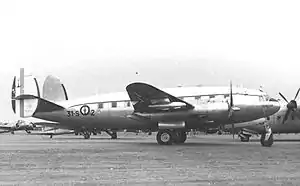Sud-Ouest Bretagne
The Sud-Ouest S.O.30 Bretagne was a 1940s French airliner built by Sud-Ouest.
| S.O.30 Bretagne | |
|---|---|
 | |
| SO.30P of the Aeronavale equipped with under-wing Palas auxiliary jets at Blackbushe Airport in 1955 | |
| Role | Airliner and military transport |
| Manufacturer | Sud-Ouest |
| First flight | 26 February 1945 |
| Primary users | Air France French Air Force |
| Number built | 45 |
Design and development
The Bretagne (Engl. "Brittany") was designed by a group of designers and engineers who were based at Cannes from May 1941 following the invasion of France. The design was for a medium capacity civil transport, a twin-engined mid-wing cantilever all-metal monoplane. The prototype (designated the S.O.30N) first flew on 26 February 1945.
Operational history
The initial production version was designated the S.O.30P Bretagne with two versions with different engines. The aircraft operated with a crew of five and could carry between 30 and 43 passengers. A cargo version (the S.O.30C) was produced, with a revised interior and strengthened floor and large cargo door. The aircraft was operated as an airliner, but mainly by the French military forces as a medium transport.
Some aircraft were fitted with two underwing Turbomeca Palas turbojet engines for auxiliary power. Other aircraft were used for engine-trials fitted with the SNECMA Atar 101 and licence-built Rolls-Royce Nene turbojets.
Variants
- S.O.30N
- Tailwheel undercarriage prototype, c/n 01 built after the 1940 armistice and stored till after the war. The second S.O.30R c/n 02 was built in 1946 and later converted to the S.O.30 Nene, jet powered airliner test-bed.
- S.O.30R Bellatrix
- Two prototypes of the nosewheel undercarriage production model.
- S.O.30C
- cargo version, one built with belly loading hatches.
- S.O.30P-1
- production version with Pratt & Whitney R-2800-B43 engines.
- S.O.30P-2
- production version with Pratt & Whitney R-2800-CA13 engines.
- S.O.30 Nene
- One aircraft converted from S.O.30R c/n 02 for use as a testbed, powered by two Rolls-Royce Nenes.
Operators
Civil operators
Specifications (S.O.30P-2)
Data from Jane's All The World's Aircraft 1953–54,[4] French Post-War Transport Aircraft[5]
General characteristics
- Crew: 4
- Capacity: 43 passengers
- Length: 18.95 m (62 ft 2 in)
- Wingspan: 26.9 m (88 ft 3 in)
- Height: 5.9 m (19 ft 4 in)
- Wing area: 86.2 m2 (928 sq ft)
- Empty weight: 14,000 kg (30,865 lb)
- Max takeoff weight: 20,250 kg (44,644 lb)
- Powerplant: 2 × Pratt & Whitney R-2800-CA18 18-cyl. air-cooled radial piston engines, 1,815 kW (2,434 hp) each for take-off with water injection
- Powerplant: 2 × Turbomeca Palas optional 1.47 kN (330 lbf) turbojet booster engines under the outer wings
- Propellers: 4-bladed constant-speed fully feathering propellers
Performance
- Maximum speed: 575 km/h (357 mph, 310 kn)
- Cruise speed: 438 km/h (272 mph, 237 kn)
- Range: 2,175 km (1,351 mi, 1,174 nmi)
- Service ceiling: 8,000 m (26,000 ft)
- Rate of climb: 6 m/s (1,200 ft/min)
See also
Aircraft of comparable role, configuration, and era
Related lists
References
Notes
- Stroud 1966, p. 203.
- Stroud 1966, p. 202.
- Stroud 1966, pp. 202–203.
- Bridgman 1953, pp. 152–153.
- Chillon, Dubois & Wegg 1980, pp. 23–25
Bibliography
- Bridgeman, Leonard. Jane's All The World's Aircraft 1953–54. London: Jane's All The World's Aircraft Publishing Company, 1953.
- Chillon, Jacques; Dubois, Jean-Pierre & Wegg, John (1980). French Post-War Transport Aircraft. Tonbridge, UK: Air-Britain. ISBN 0-85130-078-2.
- Gaillard, Pierre & Marchand, Alain (June 1988). "Le SO 30P Bretagne: la carrière civile (fin)" [The SO 30P: The Civilian Transport (End)]. Le Fana de l'Aviation (in French) (223): 42–46. ISSN 0757-4169.
- Gaillard, Pierre & Marchand, Alain (June 1990). "Le SO 30P Bretagne (3)" [The SO 30P Bretagne (3): dans le Armée de l'Air]. Le Fana de l'Aviation (in French) (247): 34–38. ISSN 0757-4169.
- Stroud, John. European Transport Aircraft since 1910. London: Putnam, 1966.
Further reading
- Bridgman, Leonard, ed. (1947). Jane's all the World's Aircraft 1947. London: Sampson Low, Marston & Co. pp. 141c–142c.